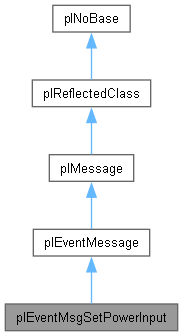 |
Plasma Engine
2.0
|
 |
Plasma Engine
2.0
|
This event is posted by plPowerConnectorComponent whenever the power input on a connector changes. More...
#include <PowerConnectorComponent.h>

Additional Inherited Members | |
 Public Member Functions inherited from plReflectedClass Public Member Functions inherited from plReflectedClass | |
| virtual const plRTTI * | GetDynamicRTTI () const |
| bool | IsInstanceOf (const plRTTI *pType) const |
| Returns whether the type of this instance is of the given type or derived from it. | |
| template<typename T > | |
| PL_ALWAYS_INLINE bool | IsInstanceOf () const |
| Returns whether the type of this instance is of the given type or derived from it. | |
 Static Public Member Functions inherited from plNoBase Static Public Member Functions inherited from plNoBase | |
| static const plRTTI * | GetStaticRTTI () |
This event is posted by plPowerConnectorComponent whenever the power input on a connector changes.
When a connector gets input through it's connection to another connector, this message is sent. This can then be used by scripts on parent nodes to switch other functionality on or off. Both the previous and new value are sent, so that the difference can be calculated. This is useful in case a script has multiple connectors and needs to keep track of the total amount of power available.